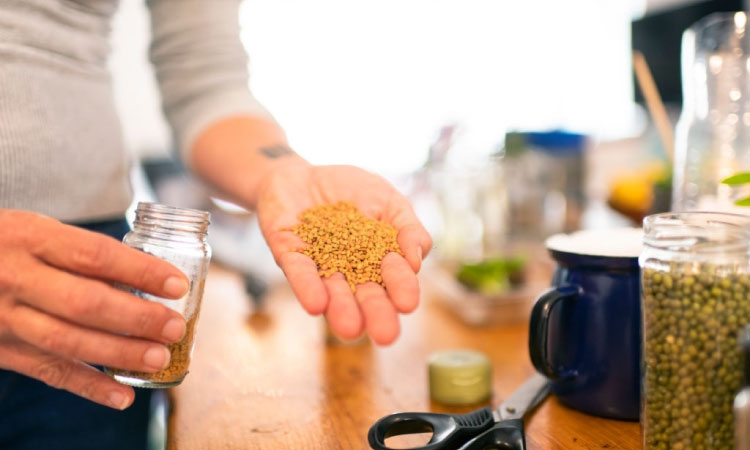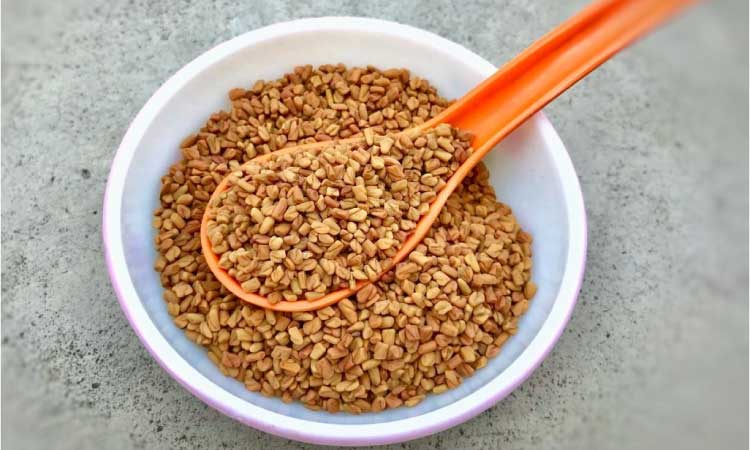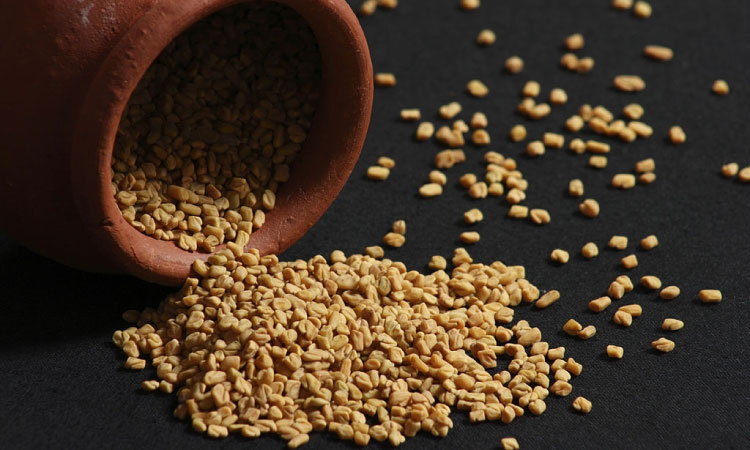A breastfeeding mother often experiences her milk supply decreasing. Even those mothers who generally generate a good milk supply often face an occasional decrease in their milk supply. Many factors like stress, fatigue, etc. can contribute to it. Using fenugreek seeds to increase breast milk supply is practiced in India for generations.
This article helps you to understand everything about consuming fenugreek seeds to increase breast milk supply.
Can Fenugreek Seeds Help Increase Breast Milk?
Not all lactating mothers can produce enough breast milk. The good news is that there are certain foods that can directly contribute to the production of breast milk. These foods are called galactagogues. Fenugreek is one such food that aids in the production of breast milk.
These magical seeds are well known for their galactagogic properties. For ages, lactating mothers have used fenugreek seeds to increase breast milk supply. Studies also prove that consuming fenugreek contributes significantly in enhancing breast milk production. Fenugreek is one of the key ingredients in all the products that aid in the production of breast milk and is also one of the Indian foods that make breast milk tastes great.
How do Fenugreek seeds contribute to breast milk production?
The mechanism of how this magical herb acts as galactagogue has not been figured out completely. Fenugreek is an excellent source of omega 3, iron, calcium, B vitamins. It also contains a considerable amount of antioxidants like beta carotene.
These flavonoids, minerals, and vitamins in fenugreek are highly beneficial for breastfeeding mothers. Moreover, fenugreek is a Phyto estrogenic plant (a plant that contains phytoestrogen, an estrogen-like compound in its natural form). The parts like seeds also carry these compounds.
Apart from phytoestrogen, Fenugreek also contains a compound called diosgenin, plant-based estrogen, that can be chemically converted into progesterone hormone. It is believed that these components of these tiny seeds give them amazing galactagogic properties.
How long does fenugreek stay in breast milk?
Fenugreek capsules are found to boost breast milk production within 28 to 72 hours after consumption. Its effects won’t last long after you stop having it as a galactagogue. Fenugreek takes around 48 – 72 hours to get out of the system. However, it remains in breast milk for around 2 hours.
Once the breast milk flow has reached the required level, you can discontinue or reduce your intake of fenugreek. However, never stop the intake of fenugreek suddenly. Instead, reduce its consumption gradually so that the milk supply is not adversely affected.
After stopping the intake of fenugreek, if the baby continues to feed the breasts regularly, the breast milk flow will not be affected further. Also, there is nothing wrong in consuming fenugreek on a long-term basis if a mother shows signs of low milk supply and also for mothers who want to pump and store their breast milk.
How Safe Is Fenugreek During Pregnancy?

Fenugreek is perfectly safe for breastfeeding women and their babies. That being said, it is advised that women who are pregnant, diabetic, allergic to chickpeas and peanuts, and women with hypothyroidism must consult their doctor prior to adding fenugreek to their diet.
How To Eat Fenugreek Seeds To Increase Milk Supply?
As low breast milk is one of the biggest challenges faced by breastfeeding mothers, given below are a few different ways by which you can consume fenugreek seeds to help boost breast milk supply:
1. Chewing Seeds
It can be effective to consume around a teaspoonful of fenugreek every day. Simply allow it to soak for around 3 to 4 hours in order to make it soft and chewable. Some people also make a habit of drinking the water used to soak the seeds, which is also fine.
2. Fenugreek Sprouts
Fenugreek seeds sprouts when soaked in lukewarm water until they soften after which the water is drained and seeds are kept in a dark, warm place. These sprouts may be used in salads or consumed directly. This sprouted form is one of the tastiest forms of fenugreek seeds, while also being one of the healthiest. They also add no short amount of nutrition or taste to salads if that is what you prefer.
3. Fenugreek Tea
Consuming tea made out of fenugreek seeds greatly helps to increase milk flow in women who are lactating. In order to make the tea, simply add hot water to around a teaspoonful of seeds and allow it to seep. Soak the seeds overnight, and boil them in the morning for roughly 5 minutes and then strain the seeds, what remains is fenugreek tea. This can be consumed with honey if you prefer so. This tea is very helpful in bringing out the nutrition in fenugreek seeds and can be consumed daily till you get the desired increase in milk supply.
4. Powder
Consuming fenugreek powder is yet another way by which you can increase breast milk production. Simply dry roast a handful of seeds and grind it to a fine powder. This powder may also be used to flavor curries and other dishes if you so choose. Drinking fenugreek powder with milk benefits your breast milk production by no short amount. But make sure that you are not adding fenugreek in certain foods that should be avoided during breastfeeding.
5. Capsules
Fenugreek capsules are often easily available at your local pharmacy and can be quite helpful. However, it is important that you consult your doctor before consuming them, in order to determine the right dosage. Usually, consuming a single capsule around 2 or 3 times per day is effective.
6. Fenugreek Rice Porridge
A porridge consisting of fenugreek seeds can be really effective in boosting breast milk production. Prepare the porridge by adding around 2 tablespoons of fenugreek seeds to a cup of rice, with water and salt, and pressure cook them until soft, your fenugreek rice porridge is ready to be consumed.
7. Dosa
Fenugreek seeds may be used while preparing a dosa, by grinding them with the rice and lentils while preparing the dosa batter. This can prove to be a quite healthy and delicious breakfast recipe and will be effective in boosting breast milk production as well. Thinking of a spicy dosa, don’t worry and stop wondering if you can eat spicy foods while breastfeeding.
8. Methi seeds –jaggery combo
Soak fenugreek seeds overnight and grind them into a fine paste. Take a teaspoon full of this paste and add it to a glass of diluted coconut milk. Add jaggery powder to taste. Make sure it is of juice consistency. You have to drink this as soon as the juice is ready. If not, it will become sticky
This combo can be quite delicious and greatly effective in boosting your breast milk production. First, roast methi seeds in pure Ghee until it is pleasantly fragrant. Cool this and prepare a mixture by grinding it with the required amounts of jaggery, and store it in an airtight container. Consume one tablespoon every morning on an empty stomach to get the best results.
How much fenugreek should I take to increase milk supply?

Breastfeeding mothers consume fenugreek in different forms to increase their breast milk supply. The optimal quantity depends on the form of fenugreek.
- If you plan to take the capsule form of fenugreek, 2- 3 capsules are fine to take. However, ensure each capsule amounts 580 mg to 610 mg only.
- If you are having fenugreek tea, you can safely drink fenugreek tea twice or thrice a day. However, make sure that it never crosses three cups in a day and limit the intake to one cup at once.
- In the case of the powdered form of fenugreek, you can have half to one teaspoon three times a day.
- When it comes to whole seed, 3 to 4 grams of fenugreek seeds soaked in warm water are fine to take.
Note* This is effective for women who require a moderate increase in milk supply. Higher dosages may be required for women who require a greater boost. To increase lactation, fenugreek should be consumed in the proper dosage. Make sure to consult with your dietician to determine the appropriate dosage for you.
How long does it take for fenugreek to increase milk supply?
Fenugreek seeds work rather quickly, so it usually doesn’t take long for women to see a change in their breast milk production. However, everyone’s body is different, and as such, not everyone can expect the same results. While some women need to wait a while longer before seeing considerable results, others may discover that fenugreek simply is not the answer for them.
While most people report seeing changes as early as within 24 to 72 hours, others have reported that they had to wait roughly 2 weeks before seeing a considerable increase in breast milk production. Fenugreek will do its work in time but the mother should also be ready with a few things that are needed during breastfeeding.
Side Effects And Precautions On Eating Fenugreek Seeds During Breastfeeding
Though fenugreek has numerous health benefits, excessive consumption of these tiny seeds will not be favorable to both mother and the baby. Let us now look at some of the side effects of fenugreek consumption during the lactating period, as well as some precautionary measures to take.
Side effects of eating fenugreek during breastfeeding
- Change in urine odor: The mother’s breast milk and urine may have a maple syrup-like odor. This will not cause any problems for the mother or the baby though but can be a sign of excessive consumption of fenugreek
- Gas and bloating: Excessive consumption of Methi seeds to increase breastfeeding is frequently associated with gas and bloating in mothers
- Allergy: Mothers who are allergic to chickpeas or peanuts may also be allergic to fenugreek. Allergic reactions comprise hives, swelling of the tongue and throat, and breathing difficulties. In case you are allergic to legume family, it is best to avoid fenugreek entirely during breastfeeding
- Loose motion and intestinal distress: Fenugreek may cause loose motion and intestinal distress in some people. Excessive consumption of fenugreek seeds can also bring uneasy stomach cramps
- Effect on babies: When a mother begins to eat fenugreek to increase breast milk supply, some exclusively breastfeeding babies may experience runny stools, an upset stomach, and bloating
- Drop in the blood sugar level: Lactating mothers with diabetes should exercise caution when consuming fenugreek, as excessive consumption can cause blood sugar levels to drop radically
Related Reading: 15 Foods That Make Breast Milk Taste Bad
Precautions to Take While Eating Fenugreek During Breastfeeding

Now that you’re aware of the risks, let’s look at some precautions you should take if you’re eating fenugreek to increase breast milk.
Here are some precautions to take when consuming fenugreek to increase breast milk production:
- Limit your consumption
- Talk with an excerpt to know about the exact dose
- Confirm that you are not allergic to fenugreek
- If you have hypothyroidism, avoid eating fenugreek as it can lower the thyroid hormone T3
Related Reading: 21 Breastfeeding Tips For First Time Mothers
Conclusion
One of the most common reasons that many new mothers choose to use the formula for their babies is that they are concerned that they will not be able to produce enough milk to meet demand. This is where natural supplements like fenugreek seeds can come in handy. Apart from increasing lactation, fenugreek seeds have a plethora of health benefits. You can use these magical seeds in their natural form to flavour foods as well as the main ingredient.
FAQs
Fenugreek has been shown to increase breast milk production in the majority of women, and doctors frequently recommend fenugreek capsules for lactating mothers. However, it may not be suitable for every woman.
Some women claim that after consuming fenugreek, their breast milk production levels remained unchanged. Having said that, low breast milk production in new mothers could be caused by a variety of factors, including poor nutrition, stress, hormonal imbalance, and improper latching of the newborn baby.
When these issues are dealt with, consuming fenugreek in its natural form or intake of fenugreek supplements contributes in boosting the breast milk supply.
While clinical data are not available, fenugreek is believed to help improve breast size. As fenugreek boosts the development of mammary glands and breast tissues, breast size may also increase accordingly.
Yes, some babies may appear colicky after drinking the breast milk, if the mother consumes fenugreek to enhance breast milk supply. To avoid this, consume the fenugreek supplement at least two hours before nursing your baby.

